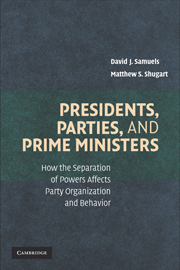 Presidents, Parties, and Prime Ministers
Presidents, Parties, and Prime Ministers Book contents
- Frontmatter
- Contents
- Preface and Acknowledgments
- Presidents, Parties, and Prime Ministers
- 1 Introduction
- 2 Political Parties in the Neo-Madisonian Theoretical Framework
- 3 Insiders and Outsiders
- 4 Constitutional Design and Intraparty Leadership Accountability
- 5 Electoral Separation of Purpose within Political Parties
- 6 The Impact of Constitutional Change on Party Organization and Behavior
- 7 Parties' “Presidential Dilemmas” in Brazil and Mexico
- 8 Presidents, Prime Ministers, and Mandate Representation
- 9 Conclusion
- References
- Index
8 - Presidents, Prime Ministers, and Mandate Representation
Published online by Cambridge University Press: 05 June 2012
- Frontmatter
- Contents
- Preface and Acknowledgments
- Presidents, Parties, and Prime Ministers
- 1 Introduction
- 2 Political Parties in the Neo-Madisonian Theoretical Framework
- 3 Insiders and Outsiders
- 4 Constitutional Design and Intraparty Leadership Accountability
- 5 Electoral Separation of Purpose within Political Parties
- 6 The Impact of Constitutional Change on Party Organization and Behavior
- 7 Parties' “Presidential Dilemmas” in Brazil and Mexico
- 8 Presidents, Prime Ministers, and Mandate Representation
- 9 Conclusion
- References
- Index
Summary
Thus far in this book we have focused on the impact of constitutional structure on such aspects of party presidentialization as agent selection and dismissal, campaign dynamics, the degree to which the electoral constituencies of different branches of a single party overlap, and on intraparty governance problems. In this chapter we turn our attention to the key policy decisions executives make – and the extent to which those decisions reflect what parties say they will do once in office, which is ostensibly the reason citizens voted that party and its candidate for the executive into office in the first place. In other words, in this chapter we ask, What is the impact of fusion or separation of powers on policy-making and representation?
We follow Pitkin (1967) generally in defining representation as a relationship between citizens' interests and political outcomes in which rulers act to meet the interests of the public. Since elections signal citizens' interests in modern democracy, we also follow Manin, Przeworski, and Stokes (1999) in focusing on electoral responsiveness – what they call “mandate representation.” Critically, conventional political science wisdom asserts that this sort of representation requires political parties. According to this view, representation requires prospective voting, in which governments “represent” citizens' interests when voters signal what they would like government to do, parties compete by proposing alternative policies, citizens use their vote to choose the best policies, and the party or parties that form the next government implement the proposed policies.
- Type
- Chapter
- Information
- Presidents, Parties, and Prime MinistersHow the Separation of Powers Affects Party Organization and Behavior, pp. 218 - 248Publisher: Cambridge University PressPrint publication year: 2010
- 1
- Cited by


